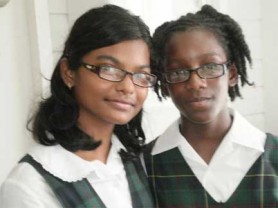* girls continue to perform better than boys
Minister of Education Shaik Baksh said pupils across the country who wrote the National Grade Six Assessment improved in Mathematics this year, a result he credited to a new interactive programme, but English remains of major concern.

The results pointed to stronger performances in Mathematics followed by Science, while English recorded a drop. Baksh said the ministry is concerned about Mathematics and English, noting that a critical part of the strategy is to conduct reviews of the examinations, in addition to placing greater emphasis on both subjects.
The number of pupils who wrote the examination in April this year was 16,351; a decrease from the 18,612 who wrote the exam last year. This year, Sonia Ghir of Mae’s Under 12 School obtained 555 out of a total 565 marks to emerge the top performer. Tauhir Khan of ISA Islamic School placed second with 553; Victoria Najab of ABC Academy came third with 551 and rounding out the top six with 550 were Shannon Woodroffe of School of the Nations, Marissa Scott of North Georgetown Primary and Petunia Wood of Winfer Gardens Primary.
Baksh noted the decrease by 1,547 in candidates who wrote the examinations compared to last year; and he again pointed to the figures which showed that girls performed better than boys in every subject and in every region.
“This is something that we continue to see,” he said of the gender disparity. Of the top 106 candidates 39 were boys and 67 were girls.
With respect to candidates entering to write the exam 8,270 were boys and 8,081 were girls. In Mathematics the male performance was 23.55% as against 27.27% for the females; in English the males recorded 19.21% and the females 23.69%; in Social Studies the males recorded 22.52% and the females 26.49% and for Science the males recorded 23.10% and the females 26.28%.
Baksh said the students recorded better numbers in Science and Social Studies this year in comparison to 2009. Compared to last year, students scoring 50% and more in the subjects written were Mathematics 34% (21% in 09); English 24% (27% in 09); Science 33% (23% in 09) and Social Studies 34% (32% in 2009).
Yet, cut-off scores were lower this year, according to a summary provided by the ministry. The cut-off score for Queen’s College was 532 marks this year as opposed to 542 marks last year; for Bishops’ High School it is 525 as against 534 last year; St Stanislaus College 519 as against 528; St Rose’s High 511 as against 519; and St Joseph High 507, as against 514.
The schools which secured the highest number of places at Queen’s College this year are Mae’s Under 12, 14; West Ruimveldt Primary, 11; Leonora Primary, 8; Graham’s Hall Primary, 7; St Margaret’s Primary, 7 and the New Guyana School, 5.
In terms of the regional performance, Georgetown was ranked at the top followed by Region Ten. Region Eight recorded the poorest performance this year, Baksh said, adding that Regions One, Seven, Eight and Nine continue to be at the bottom of the regional performances. However, he said all the regions have shown growth in 2010 relative to 2009.
Speaking on the improvement in Mathematics, Baksh said he is pleased. The minister said the Interactive Radio Instruction (IRI) programme is paying off, and the ministry is hoping to sustain and improve the performance in Mathematics in the years ahead because it is one of the subjects where concern is great. In terms of improving the general performance at the Grade Six level, he said several remedial programmes have been instituted.
Baksh said too that a Literacy Unit has been established in the ministry targeting students in after-school programmes. He said that countrywide, those children who fell below the 50% pass rate would be exposed to remedial work during the July-August break this year and stressed that every child who wrote the examinations will be placed in a secondary school and or secondary departments of primary schools.
He said the ministry has seen an improvement in resources which now inundate the school system, adding that teacher training has also intensified. According to him, they now also have a more structured approach to the Grades Two and Four assessments where some schools are targeted for a special enhancement programme. On the agenda next year, is the Grade Four literacy certificate, which means that students will have to demonstrate a literacy standard two years before the final assessment.
Assessments are done at Grade Two, Grade Four and Grade Six. At Grade Two and Grade Four, the subjects for assessments are Reading, English and Mathematics. At Grade Six, the subjects are Mathematics, English, Science and Social Studies. The Grade Two, Grade Four and Grade Six scores for each pupil are combined to determine the pupil’s final aggregated score.
Seven hundred and forty-three pupils won places at the five secondary schools which are competed for nationally: QC, Bishops, St Stanislaus, St Rose’s and St Joseph. Student allocations are as follows QC, 137; Bishops, 113; St Stanislaus, 141; St Rose’s, 220 and St Joseph 132.
The ministry said that of the top 106 pupils, 71 are from Georgetown; 15 from Region Three; two from Region Six; ten from Region Four; four from Region Two; three from Region Nine and one from Region Five. It was also pointed out that 41 of the top 106 candidates came from private schools.
The maximum score this year was 565 marks; last year it was 592 marks.
137 pupils gain places at Queen’s College







